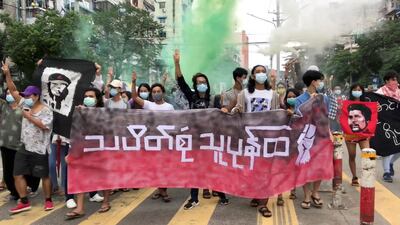The UN General Assembly on Friday passed a resolution urging a halt to the flow of weapons into Myanmar after Secretary General Antonio Guterres called for “democracy to be reinstated” in the country following a military coup in February.
Speaking with reporters after taking the oath of office for a second term as UN secretary general, Mr Guterres asked for a "clear message" from the General Assembly.
He called for “democracy to be reinstated, those that were put in prison to be liberated and for the horrible violations of human rights and the killings that have taken place to stop”.
“I hope that the General Assembly will be able to send a very clear message in this direction, because we cannot live in a world where military coups become a norm,” he said.
The General Assembly adopted the resolution with the support of 119 countries. Belarus, which asked for the resolution to be put to a vote, was the only country to oppose it, while China and Russia were among 36 which abstained.
Myanmar has been in chaos since the junta seized power on February 1 and jailed elected leader Aung San Suu Kyi and other senior members of her party.
The coup has unleashed daily protests as well as fighting between the armed forces and ethnic minority forces.
The General Assembly resolution was weeks in the making and followed talks between western countries and the Asean regional bloc, which has been mediating a crisis that could push half of Myanmar’s population below the poverty line.
An earlier draft called for the “immediate suspension” of all weapons transfers to the country, but talks with Asean saw this diluted to a call “to prevent the flow of arms into Myanmar”.
General Assembly resolutions carry moral weight, but only the Security Council can impose legally binding sanctions. Such moves require nine votes in favour and no veto from the US, Russia, China, France or Britain, the five permanent council members.
Serious action on Myanmar by the Security Council has been opposed by China and some other Asian members.
Human Rights Watch and Amnesty International have pushed for a tough General Assembly resolution to prompt the Security Council to impose an enforceable arms embargo.
Britain’s UN ambassador Barbara Woodward said on Friday “urgent action” was needed to pressure Myanmar’s junta and that the General Assembly draft was an “opportunity to send a clear message”.
“The military has committed horrific acts of violence against ordinary civilians. They have burnt villages to the ground,” Ms Woodward told reporters.
“Thousands of people have been forced to flee over the borders to seek refuge in neighbouring countries.”
The UN envoy to Myanmar, Christine Schraner Burgener, briefed the council on the crisis behind closed doors on Friday after returning from a trip to the region, which did not include a stop in Myanmar, as the junta has barred her from entering.
Speaking with reporters afterwards, she said the junta had been “surprised about the resistance of the people”, with opponents to military rule holding anti-coup protests, creating a parallel government and forming armed resistance cells.
“That's a new situation, different from the past when they had the full power,” said Ms Schraner Burgener.
The council also heard from Erywan Pehin Yusof, Brunei's second minister for foreign affairs, who was one of two envoys from the Asean regional bloc to meet Myanmar's junta leader Min Aung Hlaing this month.
The junta says it overthrew Ms Suu Kyi’s government over its refusal to address reported fraud in the November election that she won in a landslide.
International observers have said the elections were fair.
The junta’s forces have killed more than 860 people since the February 1 coup, according to the Assistance Association for Political Prisoners, a campaign group. The junta has said the number is much lower.
The UN office in Myanmar this week said it was "alarmed" by the "sharp deterioration" in the country following a discovery of mass graves and the reported torching of some 150 homes by government security forces in the Magway region.
Ms Suu Kyi's trial began on Monday, hearing evidence that she broke coronavirus restrictions during last year’s election and illegally imported walkie-talkies, her lawyer told reporters.
The pro-democracy leader turned 76 on Saturday, with opponents of the coup wearing flowers in their hair in imitation of her trademark style to mark the occasion.


